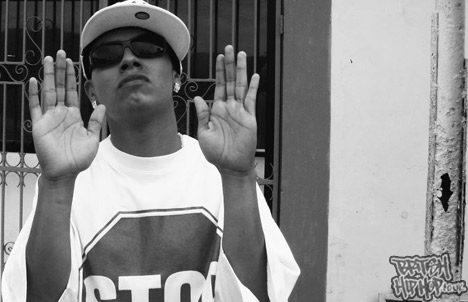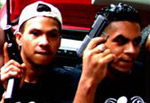The iconic cover of Public Enemy's 'It Takes a Nation of Millions…' sees Chuck and Flav locked in a jail cell, glaring into the camera, all defiant scowl and righteous pout. Hip Hop had certainly done politics before, but not like this. The message was clear. But after the photo op, Chuck and Flav walked away free men. For them, prison was merely symbolic; for rappers Anonymo, Franky Nino and the GhettoYouths project, prison is not an image – it's a daily reality.
Caught aged 19 trafficking a million dollars worth of Heroin in the South American state of Panama, Anonymo was sentenced to eight years in the notorious jungle based 'El Renacer' Federal Prison.
It was once inside his team managed to pull off their greatest entrepreneurial coup; building a professional recording studio inside El Renacer.
With the consent of the prison authorities but under constant surveillance by snipers and guards, he and fellow inmates were to record two mixtapes and four videos as well as broadcasting live shows from the belly of the beast.
While building a buzz on the Panamanian underground scene, the project has drawn worldwide recognition and even a name check from President Torrijos. Recently released, he’s on a mission to spotlight a truly unorthodox rehabilitation programme. How about some hardcore? Read on:
What was your experience of prison?
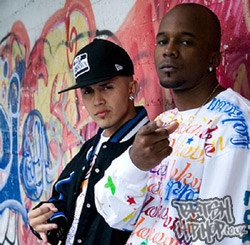 Franky Nino: It’s a very hostile environment, the Americans left Panama in serious conditions after the invasion. So the people within the prisons are simply a reflection of the collateral damage left behind. But I'd say… at first it took a minute for the inmates and the correctional system to give us the respect deserved, foreigners aren't very welcome, especially if you’re Colombian. But we managed do what we could with what we had and we honestly didn’t think it would get this big.
Franky Nino: It’s a very hostile environment, the Americans left Panama in serious conditions after the invasion. So the people within the prisons are simply a reflection of the collateral damage left behind. But I'd say… at first it took a minute for the inmates and the correctional system to give us the respect deserved, foreigners aren't very welcome, especially if you’re Colombian. But we managed do what we could with what we had and we honestly didn’t think it would get this big.
Who funded the El Renacer Studio project and why?
Franky Nino: We had several sources, though we invested most of it from our own pockets, but Anonymo did a couple jingles and produced a couple of radio commercials for recycling companies, calling card companies and radio stations. Slowly but surely we managed. It took about two years and a half, and we did this because Anonymo got locked up in there, so we had two choices… either his career would forever be lost in the rusty corner of a prison cell… or… we'd help a brother out when everyone else had let him down and at the same time develop a project no one ever thought possible. He would've lost his mind if it wasn't for the music, trust me. That prison is no walk in the park; they were supposed to extradite Noriega to that same block for his war crimes against humanity.
Do those who run the prison listen to the material recorded there? If so, do they censor it?
Franky Nino: We were running on stealth mode for all those years, the prison guards and the snipers from the towers were actually fans of our music. The penitentiary system honestly didn't care along as it distracted the prisoners and as long as we built the library for them. But per example you couldn't really do a song about trying to escape, because if it got in the wrong hands it meant you was getting transferred to heavier security detention. But in the last couple of months, now that they've seen how much attention we've manage to get from this, their trying to be more involved and their trying to monitor that a positive message is being recorded.
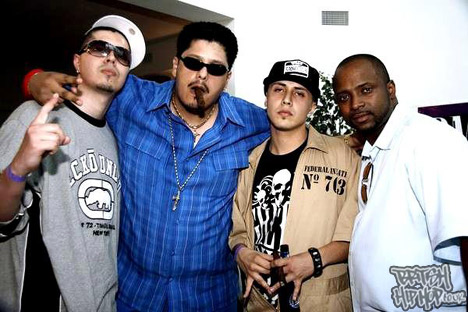
Some could argue that allowing perpetrators of violent crime a medium to express themselves while they are supposed to be being punished is unfair to the victims of these crimes. What would you say to this?
Franky Nino: The laws in Panama work in such way that you are guilty before proven innocent… So for you to even get a chance for a court hearing it could take up to five years. I mean… not everyone is innocent, but being in the wrong place at the wrong time can end up in one hell of a ride. Honestly, we just created a new form of re-socialization for these inmates; it’s as if they were normally working in wood-shops, or painting, which they do in almost every prison. And it has been proven that music is therapy for certain people. So we just really use the only set of skills we had to make the best of an unfortunate situation.
Can you describe your music and break down the themes for those who cannot speak Spanish?
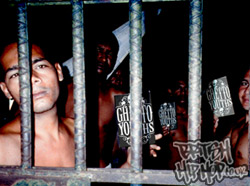 Franky Nino: We have lots of songs in English, feature some in French and obviously got a serious load in Spanish. It goes from raw hip hop that expresses the crude reality within prison or ruff neighbourhoods, to trendy dancehall that makes you forget the hard times are just around the corner, we flip on all genres of music. But I mean, what the song means to me, might not mean the same to you. It honestly depends what mood you’re in.
Franky Nino: We have lots of songs in English, feature some in French and obviously got a serious load in Spanish. It goes from raw hip hop that expresses the crude reality within prison or ruff neighbourhoods, to trendy dancehall that makes you forget the hard times are just around the corner, we flip on all genres of music. But I mean, what the song means to me, might not mean the same to you. It honestly depends what mood you’re in.
We can literally go from Reggaeton to House, from R&B to Alternative rock, we get very comfortable and versatile when it comes to making music. But I'd say… the one song that has gotten London on the dance floors has been 'Esa Mulata', it’s a dancehall riddim we got on last year for a show we had with Collie Buddz. It turned out to be a worldwide success, its everywhere now. But we got lots more coming. And my advice for those who don’t speak Spanish, it’s a minimum now days, it’s a beautiful language and I recommend y'all take a minute of your lives to discover it… and by the way… the ladies love it!
Hip Hop started out as a voice for the voiceless in North America but has become politically impotent of late. If your music is politically driven, what are the issues that Panamanians are angry about?
Franky Nino: The Ghetto Youths movement has people from all over Latin America; we got artists from Dominican Republic, Guatemala, Colombia, Africa and obviously Panama. Most of us had to leave our motherland due to the political situation and ended up in North America to sadly face the reality of being a visible minority, having to work ten times harder than the others while being discriminated against and having to learn a new language, a new culture while our parents had to have three to four jobs learning the same we were and sadly had not much time to guide their kids in the right direction, some of us made it in a honest way and others had to resolve to desperate measures, and sadly we started fettling with things we probably shouldn't have.
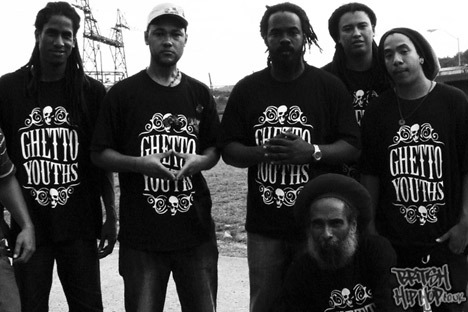
But the point is, yes Panamanians are frustrated about all sorts of things, especially how the American government placed General Noriega in power and later decided to take him down for not complying, leaving tonnes of weapons behind and through collateral damage ruining lives and devastating families for generations. Some of the inmates who make music within the jail and who have lived through that phase of Panama are obviously frustrated, but there's just is much music can do. I believe we did out part. We built a library with a studio inside a prison in a country we don't even belong to, mainly because one of our brothers was doing hard time under inhumane conditions – but at least they now have serious means of expression they use to channel their anger and frustrations through. We don't really believe in being political, we believe in bringing a raw reality to people and hopefully let them be the judges of our actions.
Considering the history of US interference in Panamanian politics, it's a testament to Hip Hop culture's global appeal that even youth in countries exploited by the US still choose it as their main form of expression. Is this just a consequence of globalisation or do you feel Hip Hop has a genuine counter cultural voice in Panama?
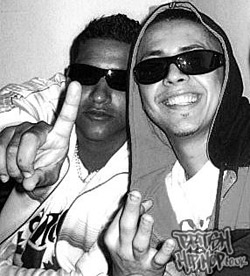 Franky Nino: The thing about hip hop is that you don’t need as much preparation or experience as other genres of music. Trust me If I could make salsa music I would.. I love salsa. It fascinates me that guitars, drums and congas, flutes, cow bells and pianos can synchronise in such harmony that it makes a rhythm good enough for you to dance to. But the thing is you need a whole orchestra with a music director and on top of that the signer and the backup singers in order for you to event start making some respectable salsa. But with Hip Hop now a days, all you really need is a laptop, an instrumental and a mic, thats it. I think hip hop blew in Latin America because it’s the only genre of music that talks about the struggle within poverty in a first person perspective, and it’s something the growing generations have gotten to like, and identify to.
Franky Nino: The thing about hip hop is that you don’t need as much preparation or experience as other genres of music. Trust me If I could make salsa music I would.. I love salsa. It fascinates me that guitars, drums and congas, flutes, cow bells and pianos can synchronise in such harmony that it makes a rhythm good enough for you to dance to. But the thing is you need a whole orchestra with a music director and on top of that the signer and the backup singers in order for you to event start making some respectable salsa. But with Hip Hop now a days, all you really need is a laptop, an instrumental and a mic, thats it. I think hip hop blew in Latin America because it’s the only genre of music that talks about the struggle within poverty in a first person perspective, and it’s something the growing generations have gotten to like, and identify to.
What American Hip Hop are you a fan of?
Franky Nino: Pharoahe Monch, Immortal Technique, Mos Def, Wu Tang, Busta Rhymes.
Where do you aim to take this project in the future?
Franky Nino: Wish we could make a movie, I wish we could tour the world from prison to prison, showing everyone how music can truly change your life, and possibly that if programs like this one would've been accessible to youngins like us when we were staring up (in an outside jail context), maybe we wouldn't have dealt with drugs in the first place, if we really thought it was possible to create music and make a decent living out of it without having to resolve to fast money, if we really thought the doors of this industry would open to us otherwise than by having to go through all this drama. But at least the youths now know that no matter how bad a situation gets, if you got your game right, you can always get back on your feet and start again. We're all human, mistakes are very common, we're just not all born with the same social advantages and sometimes we have to make sacrifices which at times could end up being way way, more than what you bargained for. The world is a jungle, be careful.
By: Max Weldon
- Here's one of the videos we recorded inside the jail.
http://www.youtube.com/v/JEzHYvnInLY
- Here's the myspace:
http://www.myspace.com/norecords
- Facebook group:
http://www.facebook.com/group.php?gid=28309277230&ref=ts
- And this is the official Website of the project:
http://www.GhettoYouths.tv
